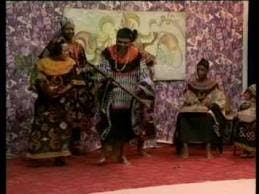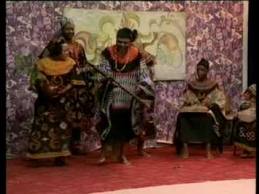Teenage Girls Flee their village for Fear of Forced Marriage to village Chief
Apr 28, 2022
Story


.
Teenage girls are reportedly fleeing Bali Gham,a village in the Santa Sub Division of the North West Region of Cameroon.The traditional ruler (fon) is currently choosing young girls to marry. It is a norm in most villages of this part of Cameroon, for a traditional ruler to oblige as many young girls as possible to be his wives.Some traditional rulers have as many as a hundred wives.
A mother from the Bali Gham village who preferred to be anonymous for security reasons told me that many young girls have their destinies ruined when they get married to these fons. She added that most of these teenage girls who innocently embark on child bearing soon after the marriage, end up not being able to carter for themselves and their children.
''I have sent my 17 year old daughter to my sister in the South West Region, she will only come back to the village when the chief has found his wives because I want her to continue with her education'',this lady confides in me.
Lum Sylvia, a 26 year old girl who was forced to get married to the traditional ruler of a village in the Mezam division now lives a promiscuous life in the city of Douala, after she smuggled herself from the palace. She was forced into the palace at the age of 18 as the 15th wife of the chief.
In a friendly discussion with her, she told me how difficult it was for her to accept the situation. “I was attending the coronation ceremony of our new chief when suddenly two masquerades (juju) forcefully wore the palace bracelet on my wrist.I was not strong enough to resist them. I was so terrified and I made a promise to run away from the village”
The bracelet is usually worn on the wrist of the ‘chosen one.’ According to the tradition of these people, once the maiden has the bracelet hanging on her wrist, she is obliged to get married to the fon, because failure to do so has far-reaching repercussions including madness and sudden death.
Lum was finally taken to the palace where she lived unhappily with 14 other co-wives. “when I had the opportunity to escape, I maximized it after five years of marriage.”
After her escape she relocated to the Littoral Region of Cameroon. She says she has no plans of getting married, “I was told that I cannot escape as a palace wife and succeed in another man’s house as a wife. So I just have to live a free life since I cannot possibly get married”.
This is a very common practice in this part of the country; many Cameroonian girls go through similar and even worst situations from their communities. Very little or nothing is done to eradicate these cruel practices.
As much as some parents try to keep their daughters away from this by sending them away from the village, other parents will do all they can to see that their teenage daughters become one of the chief’s wives. They do this in exchange for financial and material benefits.
Some fathers willfully give their daughters to the chief in exchange for a piece of farmland. Young Cameroonian girls have been likened to commodities and these arrangements often go on without the consent of the girl in question.
Madam Ndang Catherine, a counselor at the Women Empowerment Center-Bamenda says that “because of the importance attached to customs and traditions, laws protecting women are often not respected”. Cameroon is a bijural nation,giving room for the application of the customary and the civil law.In most cases the customary law is used against these young girls.
13 year old Laura told me she turned to her father whom she thought would protect her from the fierce-looking men who came to pull her to the palace, ''papa waved at me with a smile of encouragement as I looked at him with tears rolling down my cheeks''. The teenage girl was pulled into the the Bafut palace despite strong attempts on her part to resist. Her dreams of becoming a medical doctor were thrown down the drain, her destiny is now limited to farming and child bearing.
Cameroon law—Article 52 of Order No. 81-02 of June 29, 1981, on the civil service—stipulates: “No marriage may take place if the girl is younger than 15.”
This law ends is only paper based and is null and void so far as the customary law is concerned.
In most of these villages, when a new ruler is enthroned, he takes over the wives of the former ruler. This explains why some traditional rulers have more than twenty wives.
This cultural practice makes it possible and acceptable for step sons to marry and even bear children with their step mothers. In such cases the women are absolutely voiceless because failure to comply results to banishment from the land.
Article 16 of the Universal Declaration of Human Rights, 1962 states that “Men and women of full age, without any limitation due to race, nationality or religion, have the right to marry and to found a family. They are entitled to equal rights as to marriage, during marriage and at its dissolution. Marriage shall be entered into only with the free and full consent of the intending spouses”
By Chei Marvel in Bamenda.




